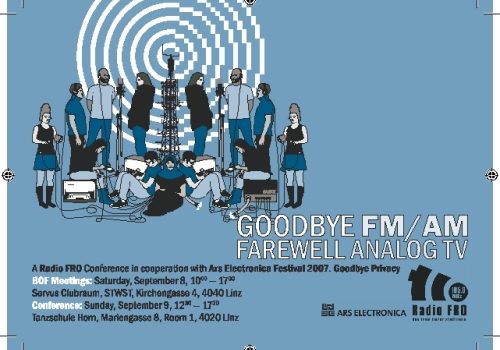GOODBYE FM/AM FAREWELL ANALOG TV
A Radio FRO Conference in cooperation with Ars Electronica Festival 2007 - "Goodbye Privacy"
This year's Radio FRO conference in Linz, in cooperation with the Ars Electronica Festival,is entitled “Goodbye FM/AM, Farewell Analog TV”, mirroring the Festival title “Goodbye Privacy”.
Privacy and especially the right to privacy are fading away these days, and similarly the broadcast landscape is changing dramatically. In the field of TV broadcast digitization is advancing rapidly, and various experiences have been gathered in the field of radio (audio broadcasting), but the question of which standards will prevail has not yet been answered.
One point of departure for the Radio FRO Conference 2007 is the recommendation of the Ministerial Committee of the European Council (made at the end of January 2007)1 that emphasizes the role of free media and free broadcasting in democratically shaping public opinion and urges the member states to promote them more strongly. It reflects on human rights and the right to freedom in a social sense and above all in the sense of freedom of the media. The elementary rights – the right to freedom of shaping and expressing opinions – call for an abundance of input from diverse sources, which is not conceivable without free access to information and to media. The media variety that was originally created through free media is now in danger of being lost to media concentrations of various kinds as a consequence of market logic.2 Media concentration does not mean here only “concentration of media ownership”, but also that codecs are being created by expert groups3 or corporate consortia, defining standards on the market that are equivalent to keys. These keys then serve to regulate access, at the same time creating new markets, licensing markets, rights administration markets, etc.
A second point of departure is the ongoing worldwide digitization of broadcasting and the planned obsolescence of analog media. The EU Commission plans to switch off analog TV frequencies by 2012. Austria has committed to discontinuing analog broadcasting by 2010. What are the new developments in digital broadcasting?
Other European and international organizations play a decisive role in this. DAB (Digital Audio Broadcasting) is the well known name of the EUREKA research project E! 147, and has consequently become an industry standard4. DVB (Digital Video Broadcasting) with all its various sub-divisions5 is the outcome of an alliance of 250 – 300 companies that has developed a standard, originally limited to Europe, but today anchored worldwide6. As an EU program, EUREKA’s7 aim is international competitiveness for the EU, meaning that it focuses on a promotion of technology that has neither a democratic set-up nor democracy as an explicit goal. EUREKA uses public funds to create a framework for cooperative research. But who is in charge politically of deciding in which direction technologies should be developed, what they should be able to do or offer, and who should be involved in these decisions? These are the questions we should be asking.
1https://wcd.coe.int/ViewDoc.jsp?id=1089615&…&BackColorLogged=FDC864
2 Three additional European Council documents are also significant here: Recommendation “CM/Rec(2007)2”, the Recommendation “Rec(2003)9” cited therein and the Report of the Media Division of the “Directorate General of Human Rights” on transnational media concentrations in Europe, “AP-MD (2004)7”.
3 (MPEG = Moving Pictures Expert Group)
4 C. Hans J. Kleinsteuber, “Die Zukunft des Radios”, “Relating Radio” – Beiträge zur Zukunft des Radios, pp. 94 ff.
5 Depending on the transmission method, there is either DVC-T (terrestrial) -H (handheld) or – C (cable); see also http://www.dvb.org/about_dvb/history/index.xml or http://en.wikipedia.org/wiki/DVB.
6http://www.dvb.org/about_dvb/history/index.xml
7http://en.wikipedia.org/wiki/EUREKA
Zuletzt geändert am 20.08.07, 00:00 Uhr

Kommentare werden von der Redaktion moderiert. Es kann daher etwas dauern, bis dein Kommentar hier erscheint. Wir behalten uns vor, diskriminierende oder diffamierende Kommentare, sowie solche, die straf- oder zivilrechtliche Normen verletzen, zu entfernen.